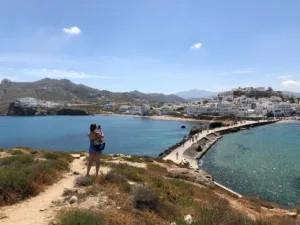Is travel really a frivolous activity?

In 2020 the Covid-19 pandemic hit and soon after ‘leisure travel’ was shut-down across the world. This was of course the right action to protect the health and wellbeing of millions. Now, more than a year later, whilst in the UK travel is not technically illegal, in the media there is a still a sense that trips abroad are unnecessary. In line with this the term ‘frivolous’ was first used by Sebastian Filep in 2014 when describing the media’s portrayal of travel. This description certainly resonates today. In his article ‘Consider Prescribing Tourism’ Filep argued that the potential wellbeing aspects of tourism have been consistently overlooked by the scientific community.
So what does the research tell us about whether travel improves our wellbeing? A recent systematic review by Garcês and colleagues (2018) identified a number of studies that had shown positive associations between tourism and wellbeing. However, on the whole studies were small and were difficult to compare due having different methods, settings, participant groups and measures of wellbeing. Given these differences, it is difficult to make strong conclusions, although the findings are encouraging. Further research is certainly needed.
Anecdotally I see there has been a shift over the years in the focus of ‘holidays’ away from largely fun and indulgent activities that were typical of package holidays in the 1990s and early 2000s. (Think massive All Inclusive resorts!). In recent years there has been a boom in ‘wellness travel’ with individuals looking to improve their physical, spiritual and emotional wellbeing through travel and resorts moving towards offering this.
So this leaves us with the question about whether travel can really enhance our wellbeing? I’m going to try and answer with how I think psychology can be applied here;
Positive psychology focuses on the strengths, characteristics and behaviours that allow individuals and communities to achieve wellbeing and to thrive (Seligman & Csikszentmihalyi, 2000). A helpful distinction to make is the difference between ‘happiness’, which is a pleasant but always temporary emotion, and wellbeing or fulfilment. Wellbeing can fluctuate and does require ‘maintenance’ but can, with the right strategies and conditions in place be fairly stable.
From positive psychology viewpoint, there are five ‘building blocks’ of wellbeing that are all applicable to travel. These are Positive emotions, Engagement, Relationships, Meaning and Accomplishment (Seligman, 2018). Applying this theory would suggest travel can increase our wellbeing when we are able to engage with culture, make relationships, take some kind of meaning or learning away from our trips, and to gain a sense of accomplishment.
As with everything psychological, the emphasis here is our perspective, what meaning we make of our experiences and whether we can use this in a helpful way. So for those of us who have strengths and coping strategies in place, a short trip may provide us with enough of a sense of meaning, connection and/or engagement to sustain our wellbeing though a challenging time or circumstance. This will be more likely if we already enjoy travel and view it as an meaningful or fulfilling experience. Our personalities, previous experiences, beliefs, preferences, life situations and relationships will all have an impact on whether this is the case.
As a Clinical Psychologist an important caveat here is that when someone is already struggling with their mood or have difficulties with anxiety, it can understandably be more difficult to realise the benefits that a change in perspective can bring. It is well documented that difficulties with mood and anxiety can result in us feeling stuck in vicious cycles of thinking and behaviour that travel or any new experience are unlikely to break. In which case psychological therapy would likely be the best course of action to take.
So in conclusion, the scientific evidence is limited. However positive psychology can help us to understand how travel can provide us with experiences that contribute to the ‘building blocks’ of wellbeing. I’m going to be looking at these in more detail in later blog posts so please stay tuned. But in short, if you ask me whether travelling is a frivolous activity, it is certainly a ‘no’ from me, but equally if we think about individual differences we can see that travel is certainly not a panacea for our wellbeing either.
References
Filep, S. (2014) Consider Prescribing Tourism. Journal of Travel Medicine, 21(3).
Garcês, S., Pocinho, M., Jesus, S. N., & Rieber, M. S. (2018). Positive psychology & tourism: a systematic literature review. Tourism & Management Studies, 14(3), 41-51.
Seligman, M. (2018). PERMA and the building blocks of well-being. The Journal of Positive Psychology, 13(4), 333-335.
Seligman, M. & Csikszentmihalyi, M. (2000). Positive psychology: An introduction. American Psychologist, 55(1), 5-14.
If you liked this article check out What are the psychological benefits of travel?
